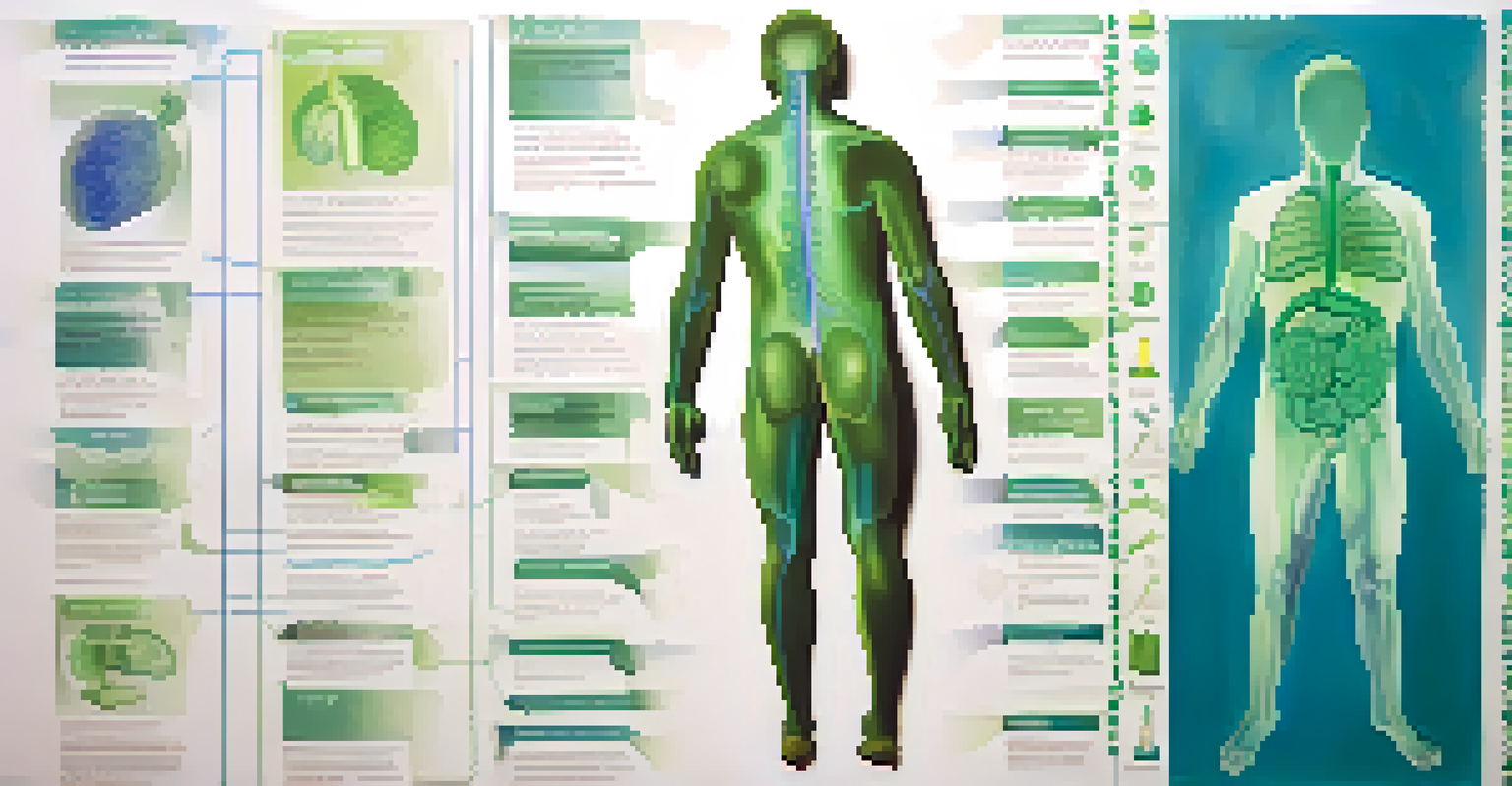The Gut-Liver Axis: How Gut Health Affects Liver Function

Understanding the Gut-Liver Axis and Its Importance
The gut-liver axis refers to the complex relationship between your digestive system and liver. This connection plays a crucial role in maintaining overall health. When the gut is in harmony, it supports liver function, helping to detoxify the body effectively.
All disease begins in the gut.
The liver processes nutrients absorbed from food, but it also filters out toxins and waste. If the gut is unhealthy, it can lead to a buildup of harmful substances that may overwhelm the liver. This highlights just how interconnected our body systems truly are.
By understanding the gut-liver axis, we can appreciate the importance of maintaining gut health for optimal liver function. It’s like a partnership where each partner relies heavily on the other to thrive.
The Role of Gut Microbiota in Liver Health
Gut microbiota, the community of microorganisms living in our intestines, plays a significant role in liver health. These microbes help digest food, produce essential vitamins, and regulate inflammation. A balanced microbiota can support liver function and prevent disease.

When the gut microbiota is disrupted, a condition known as dysbiosis occurs. This imbalance can lead to increased inflammation and toxicity, which can severely impact the liver. Imagine a factory running smoothly; if one machine fails, it can halt production.
Gut-Liver Axis: A Vital Connection
The gut and liver are interdependent, and maintaining gut health is essential for optimal liver function.
Maintaining a diverse and healthy gut microbiota through diet and lifestyle choices is key. Foods rich in fiber, probiotics, and prebiotics can nurture these beneficial bacteria, ultimately promoting liver health.
Impact of Diet on Gut Health and Liver Function
Diet plays a pivotal role in shaping both gut and liver health. Consuming a balanced diet rich in fruits, vegetables, whole grains, and lean proteins provides essential nutrients that support these organs. Think of your body as a garden; the right nutrients help it flourish.
The liver is the only organ that can regenerate itself, but it needs a healthy gut to thrive.
On the other hand, diets high in sugar, processed foods, and unhealthy fats can disrupt gut microbiota and lead to liver issues like fatty liver disease. Just like weeds can choke a garden, poor dietary choices can hinder the health of your gut and liver.
Making conscious dietary choices not only boosts gut health but also fortifies liver function. By prioritizing whole, nutrient-dense foods, you can cultivate a healthier body from the inside out.
The Connection Between Inflammation and Liver Health
Inflammation is the body's natural response to injury or infection, but chronic inflammation can be detrimental to health. It can stem from an unhealthy gut and lead to various liver diseases, including hepatitis and cirrhosis. Think of inflammation as a fire that, when uncontrolled, can cause significant damage.
When the gut is unhealthy, it can trigger an inflammatory response that affects the liver. This can create a vicious cycle where liver dysfunction further exacerbates gut problems. Understanding this link is crucial for managing and preventing liver diseases.
Diet Shapes Gut and Liver Health
A balanced diet rich in whole foods supports gut microbiota and protects liver health from disease.
Addressing inflammation through a healthy lifestyle, including stress management and anti-inflammatory foods, can protect both the gut and liver. It’s a proactive approach to maintaining balance in your body’s systems.
How Stress Impacts the Gut-Liver Connection
Stress is a common factor that can negatively affect both gut and liver health. When we experience stress, our body releases hormones that can disrupt digestion and alter gut microbiota. Picture stress as a storm cloud that can rain down on your garden, stunting growth.
Chronic stress can lead to a variety of gut issues, from irritable bowel syndrome to leaky gut syndrome, which in turn can impact liver function. The liver, responsible for detoxifying the body, can become overwhelmed if the gut is not functioning properly.
Incorporating stress-reducing practices, such as mindfulness, exercise, and proper sleep, can help maintain the balance of the gut-liver axis. By managing stress, you can create a healthier environment for both the gut and liver.
Signs of an Unhealthy Gut-Liver Axis
Recognizing the signs of an unhealthy gut-liver axis is crucial for early intervention. Symptoms can include digestive issues, fatigue, skin problems, and unexplained weight changes. These signs are like warning lights on your car dashboard, signaling that something may be off.
If you notice persistent symptoms, it might be time to evaluate your diet, stress levels, and lifestyle choices. Ignoring these signs can lead to more serious health issues down the line. It's essential to listen to your body and take action.
Inflammation Impacts Liver Function
Chronic inflammation stemming from an unhealthy gut can lead to serious liver conditions, highlighting the need for a balanced lifestyle.
Consulting with healthcare professionals can help you identify underlying issues and develop a plan for improvement. Proactive steps can lead to a healthier gut and liver, enhancing your overall well-being.
Ways to Support Your Gut-Liver Axis
Supporting your gut-liver axis involves a holistic approach to health. Start by incorporating a balanced diet, rich in whole foods and fiber, to nourish your gut microbiota. It’s like giving your body the best fuel to run smoothly.
Regular physical activity also plays a significant role in promoting gut and liver health. Exercise can help reduce inflammation and improve digestion, making it an essential part of your routine. Think of it as turning on the irrigation system for your garden.

Lastly, consider incorporating probiotics and prebiotics into your diet to further support gut health. These beneficial substances can enhance the balance of gut microbiota, ultimately benefiting liver function. Small changes can have a big impact on your health.